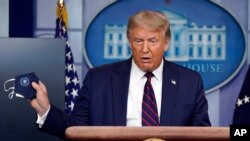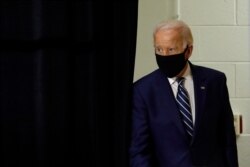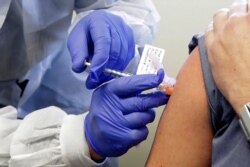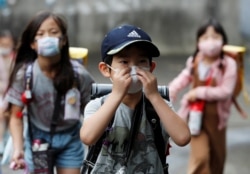President Donald Trump, who renewed daily briefings on the coronavirus pandemic Tuesday, said the number of COVID-19 cases was spiking across the country, and "It will probably, unfortunately, get worse before it gets better."
"Some areas of our country are doing very well," Trump said at his first formal White House briefing since late April. "Others are doing less well."
WATCH: Trump supports wearing face masks
The president also made his strongest statement yet regarding wearing facial coverings as a way to help limit the spread of the deadly coronavirus, which has infected more than 3.8 million Americans and killed more than 141,000, according to Johns Hopkins University statistics.
"Whether you like the mask or not, they have an impact," Trump said, pulling a face mask out of his pocket. "I'm getting used to the mask."
Trump only recently wore a mask in public for the first time, during a trip to Walter Reed Medical Center near Washington. He has rejected a national face mask mandate.
Biden
Elsewhere on Tuesday, Joe Biden, the presumptive Democratic Party presidential nominee, laid out his economic plan for the country during a speech in Delaware. He blamed Trump for failing to lead during the coronavirus pandemic.
Biden said as infections of COVID-19, the disease caused by the coronavirus, spread, "too many Americans are still out of work and losing hope."
Vaccines
Trump was alone in speaking at the briefing at the White House. None of the medical experts from the administration's coronavirus task force were present Tuesday.
He sounded optimistic about the development of possible vaccines to fight the deadly virus. "The vaccines are coming, and they're coming a lot sooner than anybody thought possible," Trump said.
With more than 14.8 million confirmed novel coronavirus cases and more than 613,000 fatalities, researchers are reporting progress on the race to develop a safe and effective vaccine against the disease.
The first possible U.S. vaccine is set to begin final-stage testing next week in a study of 30,000 people to see if it really is safe and effective, according to an Associated Press report.
Students
Meanwhile, the United Nations International Children's Fund said Tuesday the closing of educational facilities due to the coronavirus pandemic has resulted in at least 40 million preschool students worldwide missing out on learning and development.
"Education disruptions caused by the COVID-19 pandemic are preventing children from getting their education off to the best possible start," UNICEF Executive Director Henrietta Fore said in a statement. "Child care and early childhood education build a foundation upon which every aspect of children's development relies. The pandemic is putting that foundation under serious threat."
The research brief, produced by UNICEF's office of research, focused on the state of early childhood education and child care and the impact the pandemic is having on them.
The report found that an estimated 40% of children between 3 and 5 years old in 54 low- and middle-income countries "were not receiving social, emotional and cognitive stimulation from any adult in their household," UNICEF said in a statement.
Facing few early-education, child care or other social protection options, many working poor parents, particularly mothers, have been forced to bring their children to work.
"Many parents become trapped in this unreliable, poorly paid employment, contributing to intergenerational cycles of poverty," the report said.
EU relief package
Meanwhile, European Union leaders reached agreement early Tuesday on a $2.1 trillion budget and coronavirus relief package.
The agreement includes $857 billion in coronavirus funding that will be issued as loans and grants to the hardest-hit countries.
It came after negotiations stretched on for four days and nights, well beyond what was expected. A main sticking point was a divide between a group of five richer countries in the north, including the Netherlands and Austria, that advocated a cut in the original proposal of $572 billion in grants along with stricter spending controls, while others such as Spain and Italy sought to keep such restrictions to a minimum.
The final agreement included a compromise of $446 billion in grants.










